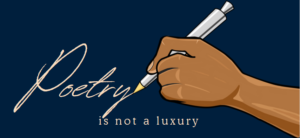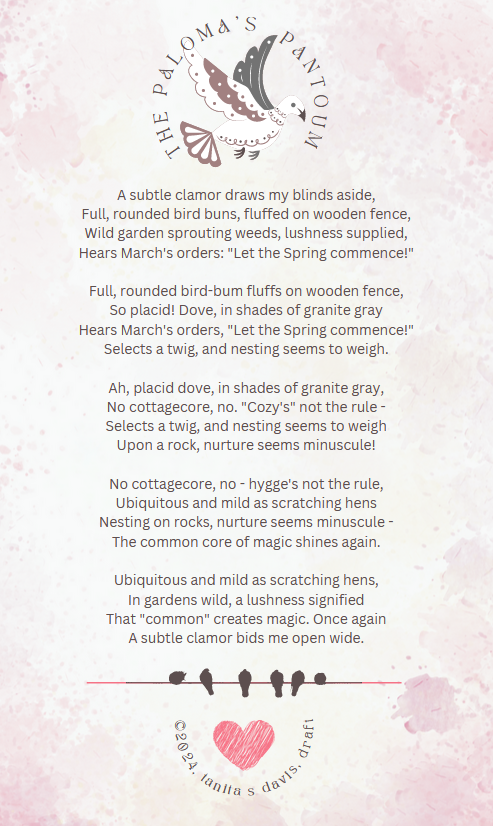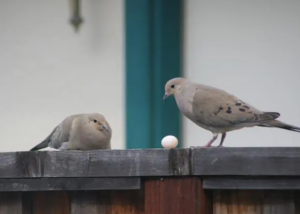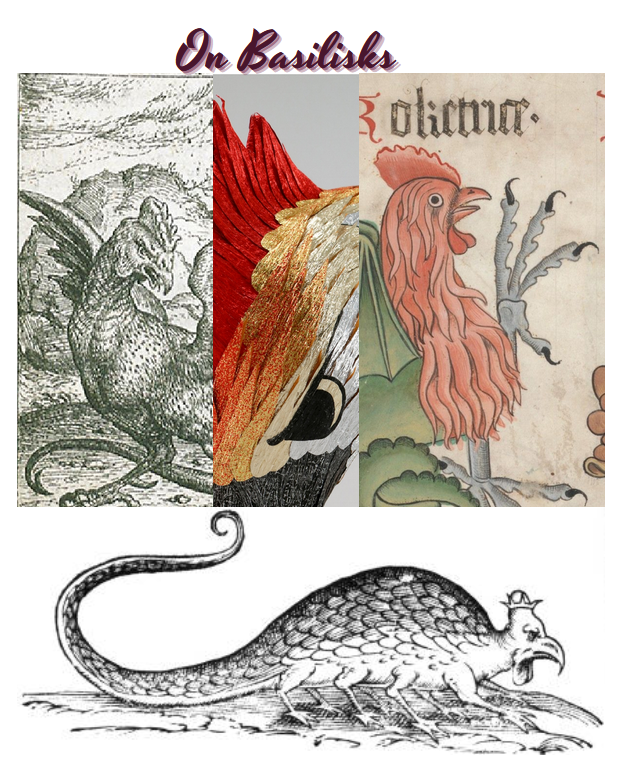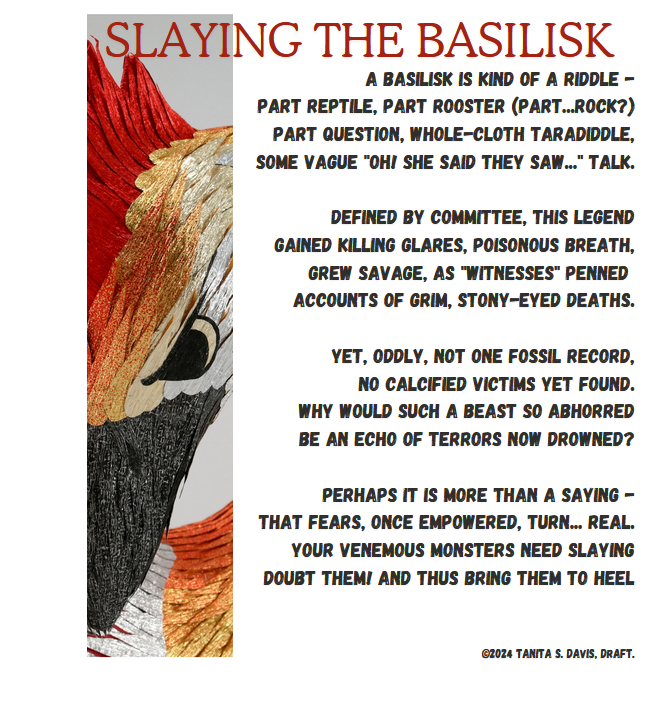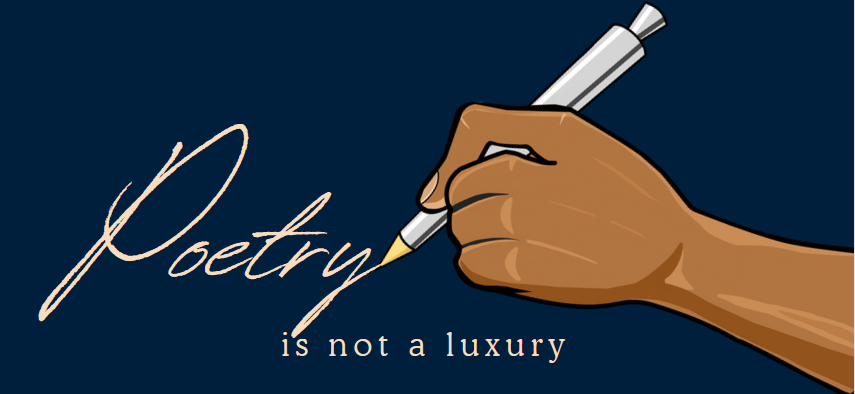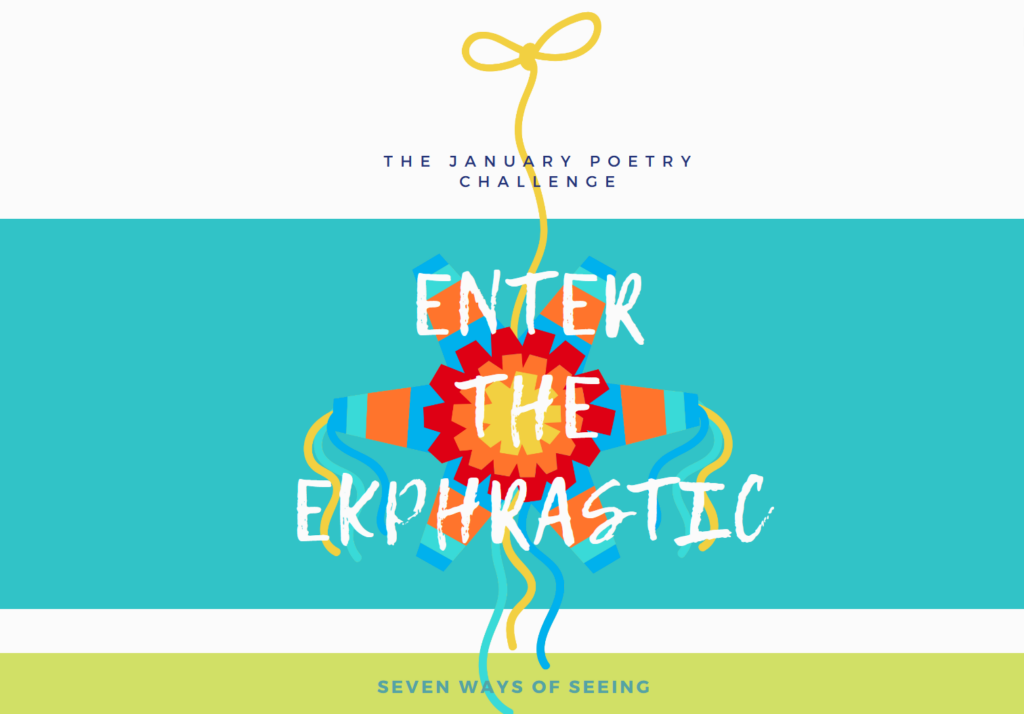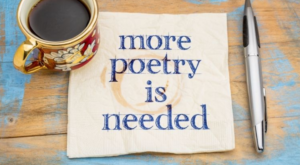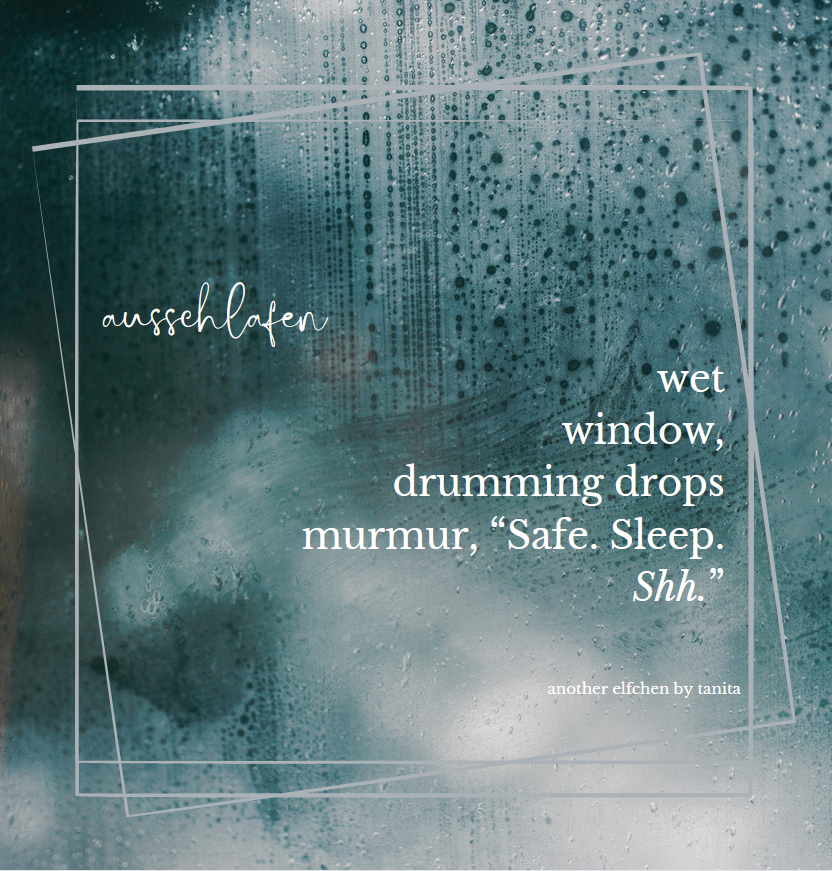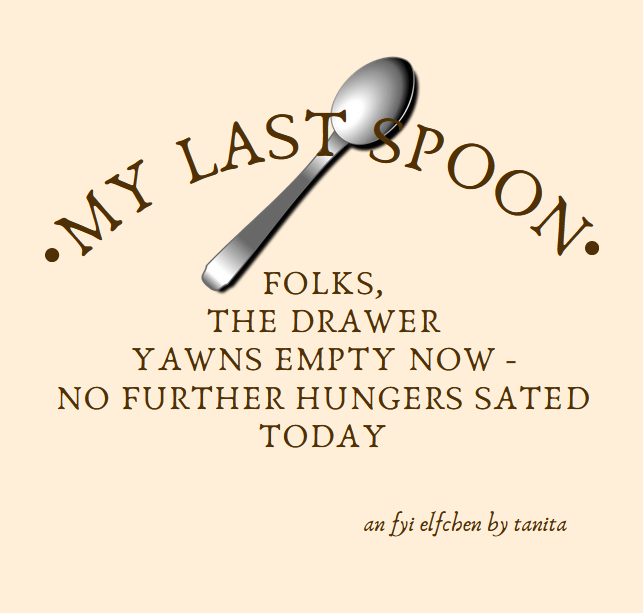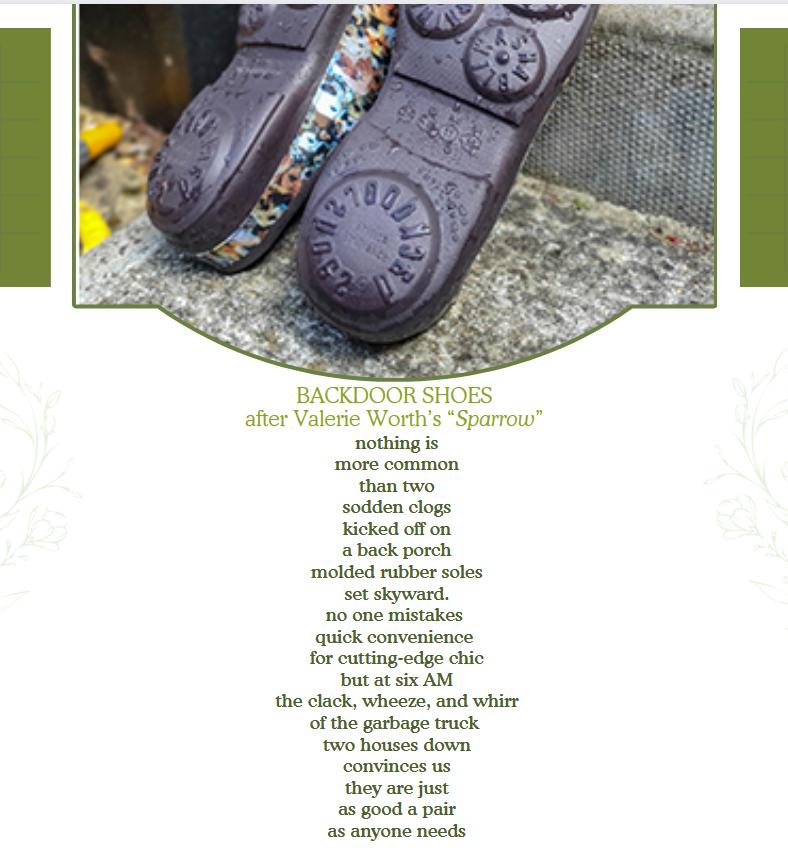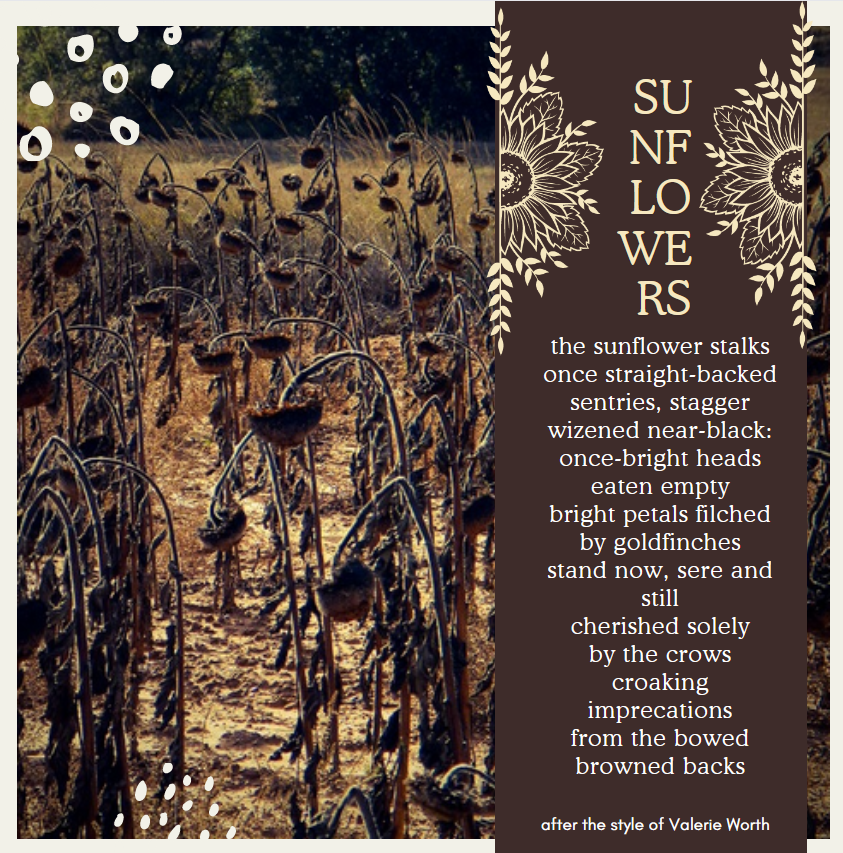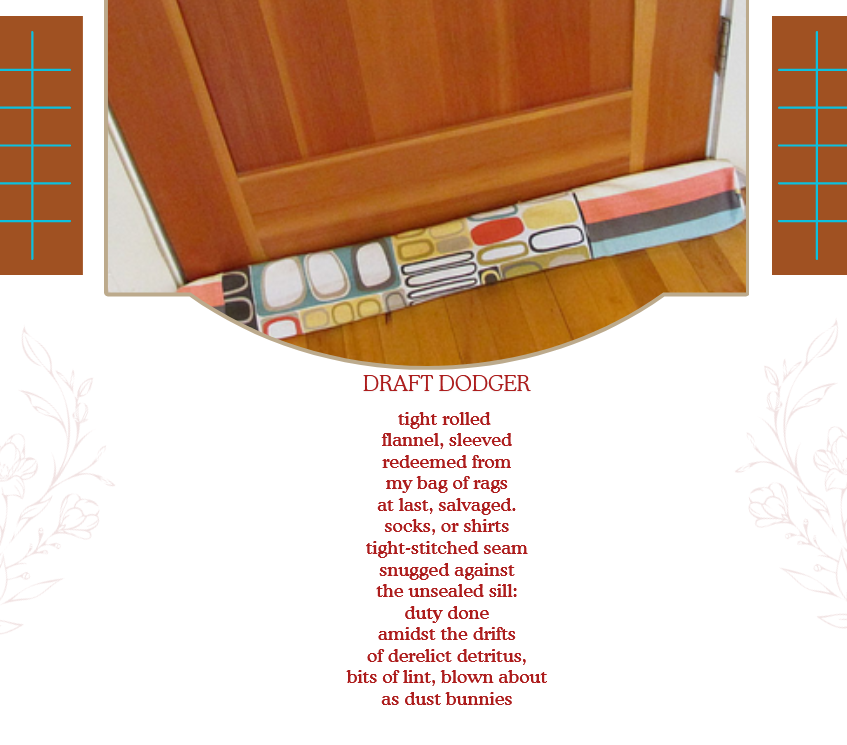Welcome to another Poetry Friday Poetry Peeps Adventure!
Poetry Peeps! You’re invited to our challenge for the month of July! Here’s the scoop: We’re indulging in ekphrastics – poetry based on pictures. We’ll be exchanging images from our personal stashes, but we’re also free to use photo from sites like Unsplash or the Library of Congress’ pictorial library to help us out. From there our poems will grow out of whatever form, topic, length, or theme. Are you game? Good! You have a month to craft your classified creation and share it on August 30th in a post and/or on social media with the tag #PoetryPals.
Poetry Pea podcast: “Hino Sōjō observed that senryū are poems that make people nod in agreement whereas haiku make people feel.” Don’t you love that? I hope you feel that nod happen for you today!
The last time we did this exercise, in 2012, I moaned about it a great deal, MOSTLY because I’d just finished an international move and still had book deadlines, but also, because haiku ads only SOUND easy, or clever people would put them in the paper and online all the time. Such a short form you’d think you could make effortlessly clever and fun, but the haiku/senryu syllabic rules are definitely working against you. Last time I tried haiku ads, were doing a “12 Poems in 12 Months” challenge that, little did we know, would end up being something we’ve done for years now, and we had a Google doc where we could all comment on each other’s work – and fuss about it. This time, we were all so busy we couldn’t even get online together for our meetup. So… everyone’s poetry today is a full on surprise. That’ll be fun!
From Process…
Since I was missing the meet-up energy I usually get in the hour we spend talking about the challenge, any form issues, and our plans, I went back to those older blog posts, where I could, and reread our clever work. I actually really liked several of them, and it reminded me of the breadth of what counts as classified ads and how we could make them a bit more mysterious (Laura’s Riddle-ku style) and less straightforward. I also brushed up on senryu – what it is, and what it focuses on – because, despite my best efforts, I don’t think I’ve written a real haiku ever in my life. Finally I perused other people’s efforts. Haiku Society of America’s senryu winners came with some really enlightening judges comments. The Atlantic’s contest was a lot of fun – some of them really made me chuckle. I feel like I’ve gotten a bit of a better feel for what the emotional range of senryu can be… even though that doesn’t mean I can definitely write it.
…To Poetry
One thing I read and observed is that the syllable form is much less strict with senryu – and I immediately decided that this time, I was going to have vari-syllabic verses. That… didn’t really happen. I tend to become very fixated on the structure of a thing, so I kept having to remind myself that “it doesn’t have to be 5-7-5. Of course, the minute I abandoned the rules, I didn’t actually like anything I wrote anymore. ☺ Typical. The second challenge was finding a leftover scrap of imagination as the next heat wave roared upon us. I began and discarded poems about breezes, wind, and cold air (there was quite a theme going on). Finally, I stepped away, determining that my best bet was to simply try writing one haiku a day, until I got more of a feel for what I was after.
I enjoy writing short poetry like this over a period of days sometimes because I can remember what I was thinking when I wrote it – and do that “nod in agreement” thing that senryu provokes in the best ways. For instance:
In search of the scoop
the straight dope from dawn’s chorus:
tweet me all the tea
This bird poetry comes courtesy of sleeping with all the windows and the slider open – and realizing just how early those little featherwits get up. I remind them that the dawn (gossip) chorus begins when there’s, you know, dawn? They disagree.
Unsought opinions
(Occasionally unhinged)
Averse ears only
Yes, these unsought opinions come in their original packaging, and they’re completely content-free!
Ah, we love an election year, don’t we? Bleh. Some of my acquaintances could really stand to keep their political texts/email forwards/comments to themselves…
Keen-eyed critic seeks
Unsentimental gazes
Hey – look me over.
I was writing a scene wherein a girl gets her first look at the engagement ring her mother’s boyfriend shows her, and I asked my writing group to gush-check me, because I am TERRIBLE at swoony scenes. I’m still the girl who asked her boyfriend, “So… are we doing this, or what?” Yes, that’s what he got for a proposal. Unsentimental gazes FTW!
Well post-bud bloom seeks
Sharp-honed shears, and speed
For circumspect snips.
Ohhh, I wanted to use secateurs – it’s such a delightful word! Sadly… far too many syllables!
July was a great month for a concise poetry form, as we’re all hip-deep in the requisite rounds of visitations and vacations that make up summertime. The brevity and the theme meant that many of us at least had a minute to try some, which makes it fun. Laura’s poem is here. Mary Lee’s poem is here. Tricia’s poem is here. Michelle K’s ads are here, Denise’s ad is here, and Jone’s ad inviting us a riparian life is here. More Peeps may haul out a haiku or two before the end of the weekend, so don’t forget to pop back to see the senryu/haiku ad round-up. Meanwhile, Marcie Flinchum Atkins (who has an interesting looking YA novel in verse upcoming!) is our Poetry Friday hostess today – thanks, Marcie! You’ll find the full Poetry Friday panoply @
Poetry Peeps! You’re invited to our challenge for the month of July! Here’s the scoop: We’re writing …Haiku/Senryu classifieds. Reprising our 2015 want ads project, we’re combining our love of Missing Connections, Desperately Seeking______, For Sale, and other random Penny Savers, Craigslist, and back-page-of-the-newspaper weirdness into deliciously brief poetry bites. Are you game? Good! You have a month to craft your classified creation and share it on July 28th in a post and/or on social media with the tag #PoetryPals. Friends, this is not a real poem. As long as we’re clear on that, okay? In the past, I was the person Most Likely To Rant about our poetry challenges, and heaven knows I’ve tried to tone that down a bit so Certain People stop giggling (looking at YOU Sara Lewis Holmes), but BOY did this one bring on the urge to scream. UGH.
I mean, technically it’s a poem – it’s …Poetry Friday and I posted it. But, that’s about all that went the way I wanted it to. Very rarely am I really, really, REALLY unable to put together words into something that at least resembles a poem… but whenever the Poetry Sisters say “no rules,” I hit a wall. This business of using the same title, but doing our own thing with no rules on form or content I KNEW was going to be a pain in the neck — so I started writing about what I wanted to write immediately. This…should have worked. In a way, it did work – I wrote a long poem in blank verse. However, I couldn’t tell when I was …done. After a while, I realized it was simply shaped prose instead of a poem. I scrapped it. I wrote a ghazel. Then two ghazels. All of them were terrible, but they had absolutely robust vocabulary, and best of all, they rhymed, which… tells some part of my brain that I’m Doing It Right. …except that Ghazels don’t rhyme (except internally), so… I scrapped those, too. Plus, did I mention they were terrible? I kept getting overly invested in the turns of phrase, and forgetting that the theme was wabi sabi. Paying attention. Transience. Imperfection. Change. I was like a kid who had the assignment – to write a paper about the Second World War and got stuck in a discussion on military haberdashery in 1944. It’s adjacent to the topic, but not there at all. After more reflection, I figured out that the real issue is that I don’t like wabi sabi as a… concept. I mean, it’s fine, but hello, it’s the melancholy awareness of the transience of living things. It’s a reminder that all things metamorphose, adapt, and die; a reminder that nothing is permanent or will stay the same or will last. Oh, goody, all of the things that the human brain is hardwired to ignore. Was this just an emotional wall I hit, a tantrum because I didn’t like the topic? No…? I mean, I wanted to write about having a big anniversary the year my brother is getting married – year one and year thirty, a month apart. That’s not a bad topic – but it’s personal. Maybe the struggle came with adding the personal to the transient – on a week when my Dad’s been hospitalized yet again. My literal baby, as in, “woke up with you, carried you, changed your diapers” baby brother is getting married. I know this is a tectonic change – that’s quite clearly being rubbed in my face. Maybe it’s just right now too much to put on one poem. That happens sometimes.
After this sprawling mess of realizations, one thing I also examined was why the first poems had disgusted me so much. I don’t usually …fling poems from me quite so energetically. Most of the time I make things work – and our Poetry Friday exercises have, for the last how many years (since 2007!?), been strictly about the PRACTICE of poetry, and not the PERFECTING thereof. But the poems struck me as slick, glib – and wordy. I can do that – I can produce words that sound good, at least – as tuneful as a drawer full of cutlery, if nothing else. But like that bright clatter, they’re basically meaningless. There’s a difference between wordplay and poetry, and too often, I err on the side of wordplay. Normally that’s fine – you can use wordplay to elevate your poem, but it’s a mistake to rely on it, and think it’s the same… Anyway, I knew I wasn’t really digging in and putting in the work to get to any Actual Feelings (TM) or Insights about the things my poem allegedly was about. So. I stopped writing. Honestly, it felt like my house was sitting on the surface of the sun, and it was too flippin’ hot to think straight anyway.
**** Fortunately, OTHER PEOPLE DID NOT POUT AND KEPT AT IT! **** Laura’s poem is here. Liz’s poem is here. Sara’s poem is here, and Mary Lee’s poem is here. Here’s Tricia’s poem, and she’s got the full Poetry Friday roundup today. Michelle K’s poem is here. Linda B’s broom wabi sabi is here. More of the wabi sabi-ing may be wafting in throughout the weekend, and I’ll post their odes to transience and imperfection as I find them – stay tuned for the roundup!
Okay, here it is, Thursday evening, and I’m left with what I’m left with – finally a lovely, temperate day and… a word salad. Flawed. Unfinished. Abandoned. As Richard Powell put it, “Nothing lasts, nothing is finished, and nothing is perfect.” Wabi sabi on the nose. WABI SABI: A Word Salad A squalid stuff, word salad – Imperfect and unfinished in still seeking distinction Clever clatter cannot cure If you can’t find the right words to write something this weekend – don’t despair. Remember that the genius is within you. The words are there – give yourself the time to think them. In the meantime, lying down with an ice pop certainly won’t hurt … Poetry Peeps! You’re invited to our challenge for the month of June! Here’s the scoop: We’re writing a poem with the title ‘Wabi-Sabi.’ Aaaand, that’s… the scoop. That’s it. A little unsure of the concept and philosophy? In his book Wabi-Sabi Simple, Richard Powell described wabi-sabi as a philosophy that acknowledges a lifestyle that appreciates and accepts three simple truths: “Nothing lasts, nothing is finished, and nothing is perfect.” We’ve left ourselves room this month to meditate on all sorts of things, including, but not limited to, ellipses, pauses, and periods to acknowledge endings. Are you game? Good! Whichever way wabi-sabi wafts you, you have a month to craft your creation and share it on June 28th in a post and/or on social media with the tag #PoetryPals. Friends, this month was a doozy. Periodically in our poetic perambulations, we wander into a quagmire and find ourselves just… stopped. Stuck. This time, it was because we were writing in the spirit of Lucille Clifton’s “homage to my hips,” and uncovered a lot of body image issues in ourselves. Here’s this lovely poet, praising the promising swing and sway of her bountiful hips, and we… recoiled from a paean of praise to our own bodies, because… eew. There was imperfection. There was wistfulness. There was frustration. There was a lot to dig through to get unstuck. Soooo, we had to do a little therapy. As one does. Results? Liz’s poem is here. Mary Lee’s affirmation is here. Tricia’s poem is here, and Laura’s is here. Michelle’s poem is here, and Linda B.’s poem is here. More peeps with poetic panegyric might sally forth to give thanks for their thighs – as I discover their poems, I’ll post them, so do check back for the roundup.
I was so, so grateful that I’d found the Bill Moyers’ recording of Lucille Clifton reading her own poem aloud. She made people laugh. She made people worry. She laughed at herself, and, gently, at their worry. She claimed she had “thrilling” body parts. In performance she was a live wire, and her joy in herself – in opposition to the societal norms which bid her condemn rather than celebrate the swish of her hips – is infectious. We all listened, and we none of us could resist that joy. So, step one, if you’re ever stuck writing something kind about yourself – listen to Ms. Lucille. I listened for the “presence” word as I reread the poem. Ms. Lucille’s hips are big, they take up space, they don’t fit just anywhere; those hips are free and have never been enslaved. They were mighty and magical, and then she offered us proof of this. When the poem is stepped through instead of skimmed, it is easier to see where her hips sort of “break through” the confinements and actions of other people’s calmer, tamer hips. With that in mind, I turned to my own poem.
Of course, that meant trying to find a body part that I could deal with. Oh, sure, I could have echoed the mentor poem, but Ms. Lucille had capital ‘h’ Hips. I have… a hinge that does the job, but without much ‘verve and swerve,’ as it were. I do have shoulders that hit all of the presence words – big, take up space, don’t fit… but five lines into trying to write about them, I became entangled in the metaphorical uses of shoulders – people use them to cry on, they have to bear the weight of the world’s problems. I have shoulders like a linebacker (with only minimal exaggeration) but I don’t always want to be leading the defense and protecting the quarterback. That’s… less about the shoulder and more about what a shoulder’s expected to do. Nope. Wrong direction. I sighed and considered. Belly buttons – what can one say about an ‘innie’ in a squishy belly? – necks – boring, really, – fingers – um, right now the joints are a bit too inflamed to be giving me praiseworthy vibes – feet, hips, spine, same issue. This is the problem with a flawed body, friends. A lot of my systems started to fail in my late twenties, and I’ve had somewhat of an adversarial relationship with my body since then. It’s too easy to find fault with it. Too easy to look at the scars of deficiencies and disorders and the associated insufficiencies and think there’s no room for homage, only abhorrence. And that’s …not good. Understandable, but not sustainable. I have to LIVE here, after all – we need a working relationship, and at minimum, respect and care and appreciation. So. Back to the drawing board yet again. I considered body parts which I actively dislike, but couldn’t summon the energy to fight myself for them. I wondered aloud if hair was a body part – I mean, technically that could count? – and then I saw a picture of a stairwell in a museum which I love, and remember walking down those stairs MANY years ago in three-inch heels (for an event) and thought, “I loved those shoes, they made my calves look…” Oh. OH! Suddenly, I was unstuck. These calves are strong calves, That was just the warm-up! There’s more poetry this Friday, hosted by Janice at Salt City Verse, exploring a great new poetry anthology, so check that out and the community’s poetry as well. Thanks much for hosting, Janice! Meanwhile, here are the calves in question: you’re WELCOME. Don’t forget what Ms. Lucille said. You have thrilling body parts. You are, both body and soul, breathtakingly made. Celebrate the wonderfulness that is you. Poetry Peeps! You’re invited to our challenge for the month of April! Here’s the scoop: As a final celebration for National Poetry Month, we’re exploring the work of Rebecca Kai Dotlich and Georgia Heard’s, Welcome to the Wonder House, and noodling through answers to what we consider to be “unanswerable questions.” How do ants sound complaining? When do stars sing? Let’s wonder as we wander through the natural world – and ask and answer those wonderings in whatever way that appeals to you. Are you game? Good! Whatever way of seeing that you choose, you have a month to craft your creation and share it on April 26 in a post and/or on social media with the tag #PoetryPals. (P.S. – Here’s an answerable question: do you know what you’re doing for National Poetry Month this April? I’m taking part in the Progressive Poem for the first time, ever. Last I looked there were a few spots left…! If you’ve never done it, why not give it a shot?) *waves* Hello especially if you’ve dropped by today because you’re one of the St. Mary’s Episcopal School scholars, or one of the EIGHT HUNDRED readers from the San Mateo County Library District who had a school visit with me this week. Welcome! Since the pantoum is a familiar and well-loved form for our Poetry Peeps, this month Cousin Mary Lee introduced Padraig Ó Tuama from Poetry Unbound, to our practice. As our brief was to write a pantoum and include animals in some fashion, we felt free to come at the project from a variety of different ways. I used these eight prompts on different days and in varying moods to get the answers to questions which might take me deeper into the topic. In answering the questions, we began to expand our thinking about ordinary interactions. While I doubt I used these prompts entirely as directed, they were a welcome push in the right direction to get me started: Write a line about something that’s become ordinary for you: The restless shift of windblown leaves. Where does this ordinary thing happen? Dust baths of birds against expanse of earth. Write a line about time: When did you notice this ordinary thing had become ordinary? A year of watching shifts of shadow through walls of window. Other surrounding events: what happens before it? what happens after it? Clamor lifts the blinds like opened eyes, revealing drowsing birds on hard fence post bed. What is a single feeling you have about this ordinary thing? Amusement at our vastly different ideas of comfort – no cottage core cozy, but a slab of post. What do you most wish to say about this ordinary thing? (You may wish to imagine yourself speaking to a person you think will listen: it could be yourself.) Open your hand to the gift of ubiquity, dust baths and freedom to flee, lending magic to the earthbound. Write a line showing us an object that’s associated with this ordinary: A curtain drawn back opens me not to sky but to dirt. Write something about your body and this ordinariness: Widening eyes expansive as horizon’s wings, I too, will settle, not soar, yet still sing. A lot of us used this prompts in various ways – or not at all. This week’s host, our very own Miss Rumphius interpreted ‘animals pantoums’ in this way. Sara saw it thusly. Liz’s poem went this direction. Cousin Mary Lee’s pantouming pointed her this way. Laura’s poem is here. Michelle K.’s poem is here. Heidi’s cardinal poem is here. Carol V’s hummingbird is here. Denise K. brought a western fence/ lizard. Linda B. joins the party here, and Margaret brought elephants! More poets may be paso doblé-ing with the pantoum, so check in throughout the weekend, for the round up, won’t you? (Seeing as it’s Easter Weekend and I’m singing with either an a cappella sextet or a full chorus with organ, bells, strings and trumpet voluntary every day from now until Sunday, I might be slow, but I’ll get there!) As you can see, for me it was less about answering the questions and rearranging them for actual use in a poetry, and more… just idea generation, which I used as a springboard to create subtle differences in the way I use the traditional pantoum repetition. Once I started expanding on the prose ideas, combining the ordinary with an animal really came easily. What’s more ordinary in the backyard than a dove? I have to admit that I don’t know if my doves are rock pigeons, mourning doves, white-winged doves, or common ground doves. They’re just ubiquitous – and sketchy, fluttering off if I look at them too hard. But, they’re a very common bird that I have come to have a rather uncommon love for. Growing up, my father kept pigeons. They’re faithful parents, but their nest-building tends to surprise people. They lived on rocks, before they were domesticated, and they prefer rocks for nesting. They prefer pecking leftovers on the ground, than to eat from the feeder – as a matter of fact, they won’t. They are the most low-key, low-maintenance bird to invite to the yard – and they might stay, if they feel like it – or they might skitter off and you’ll never see them again. You can put out a nesting box, and they might use it. They’re just passing and yet, they show up every year anyway. I can’t quite figure them out, and yet they intrigue me. A subtle clamor draws my blinds aside, Full, rounded bird-bum fluffs on wooden fence, Ah, placid dove, in shades of granite gray, No cottagecore, no – hygge’s not the rule, Ubiquitous and mild as scratching hens, I wasn’t joking about their preference for fence posts and their tendency to “select a twig” and weigh the idea of making an actual nest; rock pigeons and doves make equally flimsy, horrifying-to-non-dove-observers, deeply un-cozy nests. This image is courtesy of Nancy Carver of Livermore, from our local paper’s annual weird nest “contest” several years ago. What ordinary thing captures your heart, and elevates your thoughts? What beauty and grace is there in the commonplace in your life? May it pry your heart open wide this weekend. Pax.♥ Poetry Peeps! You’re invited to our challenge for the month of March! Here’s the scoop: We’re writing animal pantoums. This delightful Malaysian poetic form will pair perfectly with beasts of all kinds – wild or domesticated. Are you game? Good! Whatever way of seeing that you choose, you have a month to craft your creation and share it on March 29 in a post and/or on social media with the tag #PoetryPals. I love letters, and I don’t think it’s unfair to say that I could write a pretty good love letter if I put my mind to it… but somehow writing a poetic epistolary felt beyond me this month. Mainly because I am… burnt out to ashes. There’s been a lot of drama going on (2024 CONTINUES to be that special snowflake) PLUS I have a bunch of editorial notes and a big fat revision going on – which is honestly great news, my editor is brilliant, but… I’m just pooped. My body tends to respond to stress by… stressing out further. There’s some switch in my brain that trips that keeps me up, unable to quiet my mind, because SOMETHING IS WRONG AND I MIGHT BE ABLE TO DO SOMETHING TO FIX EVERYTHING IF I JUST STAY UP AND OBSESS. Yeah, it hasn’t worked so far, but my brain remains determined. This month is supposed to be about writing love letters, but I have no love for insomnia, and that’s all I could fixate on. Kelly helpfully suggested that I might flip that script, and write about insomnia’s love …for me. Honestly? I hadn’t spent a lot of time thinking about anything but how grinding this was. Insomnia is like your worst night, on repeat. I knew I wanted a repeating form to work with, but I couldn’t think beyond that. The minute Kelly gave me her suggestion, I was able to shift my viewpoint, and found an entry point to writing not one, but two epistolary poems, in conversation with each other. After all, doesn’t every love story have two sides? There’s the unhinged pursuit… As lightning streaks, your thoughts fly through From deepest darkness, oh the sight Those signals sparking, rendezvous – They surge and twist, your thoughts. Delight! And then, there’s the pointed refusal… Your ‘som’ shapes softly somnolence Why me, Insomnia? Reply! Oh, well. Better luck next time… I guess. Insomnia will, doubtless, keep trying… I spent a lot of time giggling writing this, so thank you, sweet Kelly, who is always a positive energy in the universe, for making me laugh, and reminding me that there’s ALWAYS another way of seeing things. There’s more love stories, or anti-love stories waiting, thanks to our Poetry Friday host Tabatha, at The Opposite of Indifference. Want to see what everyone else came up with for love poems? Sara’s epistle to February is here. Mary Lee’s love letter is here. Laura’s affectionate missive is here, and Tricia’s loveliness is here. Michelle’s epistle to a sparrow is here, Linda B’s first heartbreak poem (it counts, Linda) . Carol V’s poem is here, and Linda M’s poem is here. More Poetry Peeps will be penning tender phrases to all manner of animal, vegetable, and minerals this weekend, so stay tuned and I’ll post more links as I find them. Until then, dear ones – keep your pillows soft and your screens off. This too shall pass. Poetry Peeps! You’re invited to our challenge for the month of February! Here’s the scoop: We’re writing …love letters. Epistolary poetry in the form of a love poem can pull us in any number of directions. We’re writing our ways of seeing love as an animal, vegetable, mineral, emotion, decision – or anything else. Are you game? Good! Whatever way of seeing that you choose, you have a month to craft your creation and share it on February 23 in a post and/or on social media with the tag #PoetryPals. Mere weeks ago, I can remember thinking to myself, “If I can just make it through December…” Hm. Well. January is proving to be its own special level of Hades so far. First, I got roped into just “beefing up the choruses” for a Pergolessi piece, and somehow ended up doing a solo and a duet on top of the chorus pieces. Then, I was given a draft deadline a week before said concert for next year’s middle grade novel, and I figured out one day that the act of opening the document for my draft made me physically ill, I hated it so much, so obviously then I started rewriting THE ENTIRE THING a week before said deadline… and, THEN one of my parents had the temerity to have a minor heart attack. Oh, 2024, you’re a special snowflake already. You’d think this would mean I would a.) bow out, or b.) sensibly at least cut my research short for our first Poetry Friday venture of the year. …*crickets*… That would have made sense, wouldn’t it? ::sigh:: It’s been a joy to revel in the work of Roberto Benavidez, the South-Texas sculptor who specializes in the piñata as an art form. The color and light and movement in his work is a serious treat on these gray, soggy days. From poking around on the artist’s Instagram page, it appears that it’s done via layering the thin pieces of crepe paper. Some of the paper is impregnated with glitter, but a lot of the effect is simply light filtering and refracting through the thinnest layers of paper, and it is… *chef’s kiss* WOW. We Poetry Sisters gave ourselves the latitude to write an ekphrastic poem on any of his wide body of work, and that, in itself, was a little daunting. Initially I found myself fixated on his treatment of birds, and thought that’s the direction I was going… until I saw the Medieval Bestiary from his Illuminated Piñata show. The basilisk isn’t a bird… but it’s also a bird? Or something. I obviously needed a deep-dive into the medieval mindset on monsters, didn’t I. (I mean, what deadline?) Before I get too distracted, you should see what Sara did. Or, what Laura came up with (when she wasn’t serving as the Poetry Princess Archivist, and updating all of our challenges since sometime in 2007. Thank you, Laura). Cousin Mary Lee’s way of seeing is here, Tricia’s piñata poem is here, and Liz‘s project is here. Denise K.’s poem is here, Linda M.’s celebration of the artist is here. Michelle K.’s sandpiper piñata poem is here, and Linda B.’s meditation on the Hieronymus Bosch piñata is here. (*snicker*) You might discover more Poetry Peeps checking in throughout the weekend, so stay tuned for the full round-up as I find them. Meanwhile… Poetry Friday is ably hosted today by Susan @ ChickenSpaghetti, who I “met” blogging sometime back in 2005. Here’s to the blogosphere, which, when it’s not giving us nonsense, sometimes gives us both good friends and good old friends. I won’t bore you with all of my reading, but I had to share a few of the hysterical historical images I found, as well as a couple of significant points: one, a basilisk was mostly a basilisk in Europe. In Britain, it was referred to in the main body of literature as a cockatrice. It’s essentially the same thing, but the Brits have always strove for distinction, historically and to the present moment. It’s part of their brand. ☺ Secondly, from Pliny the Elder on down, no one could… agree quite on what a basilisk/cockatrice looked like (I mean, the CROWN. Jeez Louise, Pliny, how much poppy was in that wine???). Or, really, even what it did. Some swore that the beast was like a giant gastropod, dragging poison via its belly and even killing plants and soil beneath it, in a wide swath, while others say its mere breath did the slaying – not to mention its gimlet gaze. So much fear! So little… detail! That… got me thinking. As I inarticulately tried to explain what I was working on in our Poetry Sisters Zoom meetup, Cousin Mary Lee said that my description of what the basilisk was – and wasn’t – sounded like politics. I kind of laughed at that, but then the thought returned insistently. So much of what we hear via the churn and spin of the news cycle regarding the Sturm und Drang of current events is like …well, like trying to swim by committee. Too many people are trying to manage the arms and the legs, trying to coordinate the strokes and the breathing as we beat the water into a froth, aerating our fears into some whipped up thing that we cannot see through. Boy, do we need to step back! Scoff. Doubt. Question. Interrogate. Take a moment and let things settle, and really look at what’s before us. Sometimes, when we truly examine circumstances, situations, and individuals which terrify us, we will find that they really are ludicrous… and then we can laugh. This poem makes it sound pretty darned easy to do all of this – just pack up our troubles in our old kit bag, or some folksy nonsense. Friends, we are all well aware how easy it’s NOT. Fears are sometimes a serious, crippling business, and I will freely admit that this is just my first-ish draft of this idea. But it’s an idea to which I’ll be returning this year – because I am sometimes a person deeply in need of getting out of my own head. Doubting our fears is the first step away from them… and I hope it’s an one which gives you a different way of seeing things. And if your 2024 is beginning with a seismic shift the likes of mine, take heart – we are in the year of the Dragon, and we can a.) start this New Year thing over and b.) immolate what isn’t working, and move on. Breathe fire, friends, and make your fears take wing. Who knows, you might be the basilisk. I love this statement from Audre Lorde’s poem of the same title – poetry is not a luxury, but a necessity to remind of us thoughts and feelings and ways of seeing. This ‘ways of seeing’ is going to be a recurring theme for me this year, as the Poetry Sisters celebrate our unique and varied visions and our ability to all look at one thing and come away with seven different ideas about it. Viva la difference! Poetry Peeps! You’re invited to our challenge for the month of January! Here’s the scoop: We’re writing ekphastic poetry on… piñatas. No, really. Those hollow-hearted paper beasts we love to beat might not be something you think are poem-worthy – usually – but you’ve NEVER seen piñatas like these. Featured on PBS’s fabulous Craft In America series, we’re celebrating the humble piñata as elevated by Robert Benavidez. Check out his work. Are you game? Good! Whichever of his creative creatures and absolutely out-there works of art that you choose, you have a month to craft your creation and share it on January 26 in a post and/or on social media with the tag #PoetryPals. May you offer art without apology as you celebrate YOUR way of seeing. Friends, it has been a year of TRANSFORMATION and we’ve been glad to have every one of you who joined us. Thanks for being one of our #PoetryPals this year. The Sisters are very shortly going to be in our annual poetry confab to come up with the 2024 challenges we’re setting ourselves, and to choose a theme or word of the year. While normally I’d let you know in this space what’s on for next month… you’ll have to stay tuned for the January 7th announcement! In the meantime, if you have a form or style suggestion, please feel free to drop it in the comments. FROM PROCESS…: Our last challenge for 2023… might have been set by me? None of us remembers anymore, but since I’m a real fan of a five line poem, we suspect me. ☺ The Elfchen is eleven words, and the -chen suffix is a diminutive, so it’s a “little eleven” poem. As I began Duolingo German this year, I was happily able to try writing with my shaky grasp of another language. The basic Elfchen rules requires ONE word for line one, TWO for line two, THREE words for line three, FOUR for line four, and returns to ONE word for the fifth line. I’ve read that the first word is meant to be a topical, setting the tone of the piece, and the final word is meant to summarize and wrap things up. I did not always feel the need to summarize, as sometimes the topic wasn’t closed, but I like knowing what I’m supposed to be trying to achieve! Of course, my restless brain took those rules and …tweaked them a little, deciding to not use only counted words, but counted syllables as well. As German is not a language known for short words, beginning with a single word of a single syllable was… definitely more of a challenge. (WHY did I feel like I needed more of a challenge? German wasn’t enough? Yikes, brain). As I made my attempts, I quickly discovered that I had to actually write in German, not take what I wanted to say in English, translate it, and then create the poem — that didn’t work at all. …TO POETRY. What worked best for me was simply to draft many, many poems. Writing egregiously bad poetry is sometimes the only way I can get to the better stuff, so I wrote and wrote, as rain rolled down my office window. This is why so many of the poems I drafted had to do with being sleepy and or wanting to be cozy and warm… and/or wanting desperately to go back to bed with a book…! I wrote so many Elfchen it got to where I was once again counting words or syllables while I was thinking. The other day I wrote in an email to a friend: “Busy”/ isn’t true/ My holiday was/ Wholly ‘booked’ this year/…reading! However, I will spare you more of my stream-of-consciousness poetry, and share what the rest of the Poetry Sisters got up to. Tricia introduces us to a reverse elfchen here. Liz’s poem is here. Laura’s poem is here. Mary Lee’s is here, and Michelle K’s myriad Elfchen are here. Carol V.’s poems are here, and Linda B.’s Elfchen is here. Denise’s poems are here, and Heidi’s irresistible Elfchen are here. More Poetry Peeps may be elfchening throughout the weekend, so stay tuned. Let It Go For Now In neither language does this fit the rules for word count, but it does make the syllabic rule work. Ausschlaffen (Sleeping In) This final poem follows the actual rules of the Elfchen and not my invented ones – in an announcement that pretty much speaks for itself and explains why many are receiving New Year’s cards: My Last Spoon Poetry Friday today is generously hosted @ More Art 4 All with Michelle K., one of our Poetry Peeps who has been playing with the Elfchen form for a couple of weeks now. May you find warmth and light as the year burns down to its coals – and may you gather a breath of strength, purpose, and hope to fan the flames again for next year. Happy New Year. Poetry Peeps! You’re invited to our challenge for the month of December! Here’s the scoop: We’re writing the eleven-syllable German cinquain, the Elfchen. Unfamiliar? There’s plenty online about this brief form, which has often been taught in German elementary schools, so intangible bonus points wenn dein Gedicht auf Deutsch ist (if your poem is in German). Are you game? Good! The Poetry Sisters are continuing to throw our 2023 theme of TRANSFORMATION into the mix as possible. Whatever your topic or theme, you have a month to craft your creation and share it on December 29th in a post and/or on social media with the tag #PoetryPals. Poetry Friends! I hope you had a lovely Thanksgiving/Friendsharing/ChosenFamily/Family Day yesterday. I am putting this blog post together a week in advance, and might not ‘see’ some of your posts right away, but I will get there and add you to the Valerie Worth round-up! What with travel and meals and homes full of guests, those of us nearby may be a bit slower – so do pop back in for a full roundup later in the weekend. Meanwhile, it was delightful to meet with almost the whole gang at our Poetry Sisters prewrite last week. You must check out Mary Lee’s poem here. Sara’s poem is here. Laura is joining us here, while Liz’s poem is here, and Tricia’s poem is here. Laura’s poem flew in to land here. Michelle K.’s poem is here. Linda B.’s poem is here. Poetry Friday is hosted by Ruth @There Is No Such Thing as a Godforsaken Town, long-distance from Uganda, so let’s take our time with Ruth and savor everything, along with a second helping of pie. “Never forget that the subject is as important as your feeling: The mud puddle itself is as important as your pleasure in looking at it or splashing through it. Never let the mud puddle get lost in the poetry – because, in many ways, the mud puddle is the poetry.” (Valerie Worth, quoted in Another Jar of Tiny Stars, the second NCTE book of award-winning poetry, edited by Bernice E. Cullinan and Deborah Wooten As I recall from our brainstorming session at the beginning of this year, we chose to write in the style of Valerie Worth first because many of us were less than familiar with much of her work, except her books for children, and secondly, because her poems are short(ish), small, plain-spoken (unrhymed), and specific. Note that when we say ‘small,’ we don’t mean an additional observation on length, but rather a topical observation on the dialed in, specific topics Valerie Worth judged worthy of poetry. Fence posts. Rags. Earthworms. Mushrooms. Valerie Worth was a poet who had, as Mary Oliver attributed to excellent writers, “an attitude of noticing.” I believe that observation lends itself to its own theme of transformation… In so many ways, when one is able to extrapolate the extraordinary from the mundane, it changes things seen, experienced, known, and understood. Inasmuch as Mary Oliver described that ‘noticing’ as a relentless and dynamic curiosity about the world, I believe that Valerie Worth’s unwillingness to exclude anything from observation is what enabled her to be a poet whose work is memorable and occasionally astonishing. To that end, in my own choosing, I purposefully looked for ‘small’ topics. I thought of my dead sunflowers, which I’ve left in place because the birds really love them, Himself’s giant clogs which I keep tripping over on the garage step, and the draft evader I fashioned from flat fiberfill stuffing and torn flannel rags. Sunflowers when they’re bright get plenty of ink – not so much when they’re dead. We might write poems to baby shoes, but not to rubber gardening clogs. Few find the wads of cloth we stuff under door and windowsills particularly poetic, and yet… I started by hewing as closely as I could to one of Worth’s actual poems. Sparrow is one of my favorites about a dun-colored bird minding her own business, and not caring if you look at her. I transferred the sparrow’s ubiquity to the boxy rubber clogs that seem to grow on the back step – worn by anyone whose feet will fit, perfect for standing in the outdoor kitchen frying something, or chucking things into the compost bin in the rain… Our garden is still quite lively, for all that it is considered functionally dead. The dry flower heads, yellow-browning speckles of mildewed stalks and fallen seeds are alive with an hundred thousand birds, chasing lizards, squabbling, pecking, rolling in dust, and scratching like hens. This is why we’re the WORST gardeners – we can’t bear to tear everything out and turn it under just yet because the birds are having way too much fun. May they all make themselves at home. (This handsome specimen isn’t MY draft stopper, which is a scrappy, patch-worked thing in various shades of ‘dirt.’ Mine is in the wash just now and unready for its close-up, so we’ll just pretend I actually stitched something pretty.) Mary Oliver’s famously succinct ‘Instructions for Living a Life’ admonishes us fussily to “pay attention.” Maybe in a less didactic tone, as there is nothing truly obligatory here, we might encourage ourselves to give attention to our lives, to see within our every day ordinariness a sheen of the extraordinary. As German actress and coach Uta Hagen once famously said, “We must overcome the notion that we must be regular…” As we tunnel out from stolid regularity into glorious irregularity, exchange our viewpoint on life as ‘usual’ for the chance to revel in the unusual, may we discover that life is more than we knew. May we, by being open, inventive, expressive, and questioning, live our uncertainty and questions into answers that change everything. All poems ©2023 Tanita S. Davis Poetry Peeps! You’re invited to our challenge for the month of November! Here’s the scoop: We’re writing in the style of Valerie Worth. Unfamiliar? Renee LaTulippe shared poet Lee Bennett Hopkins’ NCTE reminiscences on her as a poet, and Renee wrote a great post highlighting her. And, now that you’ve read a bit, are you in? Good! The Poetry Sisters are continuing to throw our 2023 theme of TRANSFORMATION into the mix as possible. Whatever your topic or theme, you have a month to craft your creation and share it on November 24th – yep, that IS the day after Thanksgiving, so plan accordingly – in a post and/or on social media with the tag #PoetryPals. We’re grateful to our Poetry Friday host today, Carol Labuzzetta Tricia’s poem right here, and Sara’s poem here. Liz’s poem is here. Mary Lee’s is here, and Laura’s popped in here. Michelle K. borrowed lines from Emily D. here. You might discover more Poetry Peeps checking in throughout the weekend, so stay tuned for the full round-up as I find them. Meanwhile… on with the poetry. The original tale of the Bouts-rimés form has to do with a nobleman complaining of having some three hundred sonnets stolen from him. As it turns out, it wasn’t sonnets at all, only the rhyming end words. Our rhyming end words were A: profuse/abstruse/chartreuse/truce; B: incline/shine/resign/supine; C: various/gregarious/hilarious/precarious, D: ceasefire/quagmire/higher/dryer, E: transform/barnstorm/uniform/conform, F: humility/futility/nobility/tranquility; G: perturb/superb/reverb/disturb. With a couple of (horrifying) exceptions, the word list isn’t really that bad – and for once I gave myself permission to use forms of the words like inclined instead of incline. However, as there are several types of sonnets, I couldn’t really decide which would work best. I dabbled a bit writing three sonnet forms, but I found I really disliked the Terza Rima with this word list, so that one won’t ever see the light of day. Instead, here’s a Shakespearean sonnet, and a semi-Spenserian. I’ve made it a s/he poem for your amusement, but I defaulted on my illustration to HE, because we live in a sexist world, and I only found two graphics of MEN yacking, and HUNDREDS of women. (This is me, doing my bit for… equality. Or something.) If such a thought serves to perturb I think the funniest thing about the next poem is that I rarely drink coffee… it’s a “Oh, sure, I’ll have some,” drink that I have maybe once or twice a week, if that. And I know that’s not other people’s experience with coffee (I’m reminded of my friend Jules’ mug that reads “Coffee! Do stupid things faster, with more energy!), so if you’re a coffee person, this one’s for you. Indeed, it’s a powerful brew that’s superb! Can we agree together to dispense with quagmire, ceasefire, barnstorm or abstruse in our poetry? Those are such delicious words, of course, and the point of this poetic game is to actually make your fellow poets work pretty hard by CHOOSING the more outré vocabulary, but oy. Barnstorm. It’s just somehow unwieldy! This time of year is just the best time for table games – sitting inside, cozy, while the weather does what it will, and we keep our brains busy. (I promise you that sitting inside, being cozy still works even if the weather doing what it will requires an air conditioner or fan to combat it.) I hope that you’re able to try this poetry game with a class, or a group of friends – even if the poems you play with aren’t as long as sonnets – admittedly those are a lot for first-timers – I know that almost everyone can write a limerick. Giving people end words for them to compose their own limerick will be… enlightening, at the very least! Never forget that DOGGEREL is also a poetic form with a long (from the 14th century!) and storied history. (For more on the cartoonist, Mickey Bach, visit the GetWords archive.) And thus we come to the end of October. The summer seemed briefly endless, and now we’re free-falling through autumn, plunging towards winter. In the month of November, that traditional time of pause, I’m going to try a daily exercise of poetic gratitude. It has been a grinding summer for me personally and physically, as well as for members of my family, for those of us nationally who love books and have deep concerns for inclusivity and freedom, and then globally – oof. I’ve gotten out of the habit of journaling over the years, so a daily poetry practice is for me one way to slow down and reflect on things which are happening, to recall what I’m meant to be doing right now, which is to be present in the moment, and then to also remember what I have done in previous years during this time. This reflective practice reminds us how troubles, though seemingly endless in the moment, always pass with time. This is an especially important message now, and I hope some of you will find a gratitude practice for yourselves in the days to come. This, too, shall pass. This moment, this place, this You is right here for a reason. You will find it. You will embody it, and you will shine. ☆You are made of stars.★ Happy Weekend.{pf: poetry peeps wabi their sabi}
Welcome to another Poetry Friday Poetry Peeps Adventure!
From Process…
…To Poetry
A wabi sabi wasteland.
A welter of syllabic stress
songs sounding dissonance.
its point lies in acceptance:
Release of our own relevance
as center of the mass.
And means of contribution,
we try for conversation,
to compel connection
what yawns, hungry, for a Word
That lasts through transiency’s attempts
to be the last thing heard.
{pf: poetry peeps sound an ode to ourselves}
Welcome to another Poetry Friday Poetry Peeps Adventure!
From Process…
…to Poem
Acclaiming My Calves
bulging muscles Foundational
to my under
standing. Like cocoa-butter silk,
when I’m bothered to shave
them, these calves – not milk-fed (yet
Outstanding in their field) –
they don’t fit into
ordinary settings
or stovepipe boots.
Solid maple, this Mare’s
shanks. These calves,
they like a lug sole
a long stride, and a
short skirt ‘cause these calves,
they gotta Breathe.
Legs louche or Ladylike, these calves,
they lay it out, straight,
no chaser, though I have known them
To stop on a dime and Flex,
To strengthen the stretch
of my strut.
draft ©2024 by tanita s. davis{pf: poetry peeps pantoum on repeat}
Welcome to another Poetry Friday Poetry Peeps Adventure!
From Process…
… To Poem
A Paloma’s Pantoum
Full, rounded bird buns, fluffed on wooden fence,
Wild garden sprouting weeds, lushness supplied,
Hears March’s orders: “Let the Spring commence!”
So placid! Dove, in shades of granite gray
Hears March’s orders, “Let the Spring commence!”
Selects a twig, and nesting seems to weigh.
No cottagecore, no. “Cozy’s” not the rule –
Selects a twig, and nesting seems to weigh
Upon a rock, nurture seems minuscule!
Ubiquitous and mild as scratching hens
Nesting on rocks, nurture seems minuscule –
The common core of magic shines again.
In gardens wild, a lushness signified
That “common” creates magic. Once again
A subtle clamor bids me open wide.{pf: the poetry peeps love a letter}
Welcome to another Poetry Friday Poetry Peeps Adventure!
From Process…
…To Poem
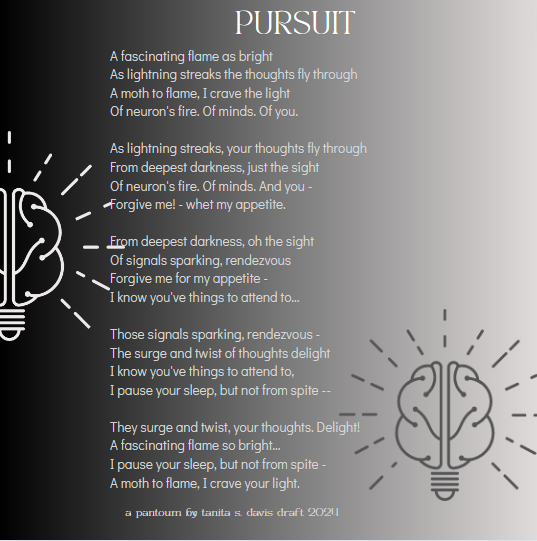
Pursuit
A fascinating flame as bright
As lightning streaks the thoughts fly through
A moth to flame, I crave the light
Of neuron’s fire. Of minds. Of you.
From deepest darkness, just the sight
Of neuron’s fire. Of minds. And you –
Forgive me! – whet my appetite.
Of signals sparking, rendezvous
Forgive me for my appetite –
I know you’ve things to attend to…
The surge and twist of thoughts delight
I know you’ve things to attend to,
I pause your sleep, but not from spite —
A fascinating flame so bright…
I pause your sleep, but not from spite –
A moth to flame, I crave your light.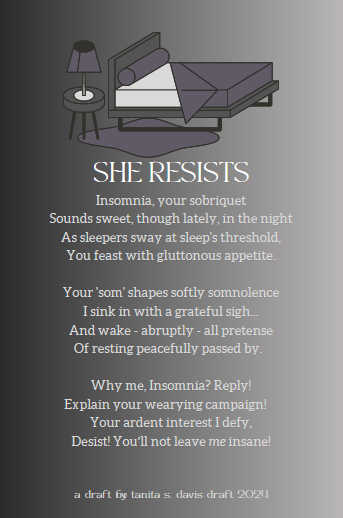
She Resists
Insomnia, your sobriquet
Sounds sweet, though lately, in the night
As sleepers sway at sleep’s threshold,
You feast with gluttonous appetite.
I sink in with a grateful sigh…
And wake – abruptly – all pretense
Of resting peacefully passed by.
Explain your wearying campaign!
Your ardent interest I defy
Desist! You’ll not leave me insane.{pf: the poetry peeps are piñata-ing}
Welcome to another Poetry Friday Poetry Peeps Adventure!
From Process…
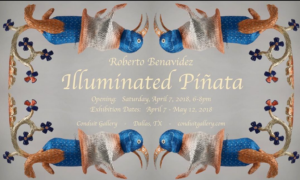
…To Poem
{posting our january poetry plan}
Welcome to another Poetry Friday Poetry Peeps Adventure!
HAPPY 2024!
{pf: poetry peeps elfchen it up}
Welcome to another Poetry Friday Poetry Peeps adventure!
Süß,
nicht wahr?
Wenn endlich
der Tag endet:
Schlaf.
————–
Sweet,
isn’t it?
When finally
the day ends:
sleep.
Wet
window,
drumming drops
murmur, “Safe. Sleep.
Shh.”
Folks,
The drawer
yawns empty now –
No further hungers sated
today.
{pf: poetry peeps in the style of Valerie Worth}
Welcome to another Poetry Friday Poetry Peeps adventure!
{pf: peeps are talkin’ about bouts-rimés}
Welcome to another Poetry Friday Poetry adventure!
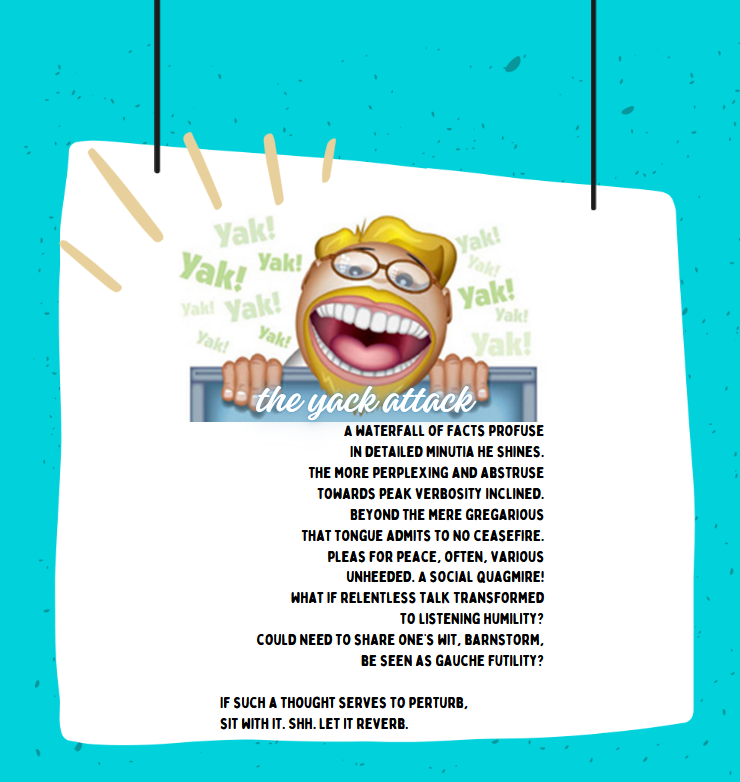
The Yack Attack
A waterfall of facts profuse
In detailed minutiae s/he shines;
The more perplexing and abstruse
Towards peak verbosity inclined.
Beyond the mere gregarious,
That tongue admits to no ceasefire.
Pleas for peace, often, various,
Unheeded. A social quagmire!
What if relentless talk transformed
To listening humility?
Could need to air one’s wit, barnstorm,
Be seen as gauche futility?
Sit with it. SHH! Let it reverb.
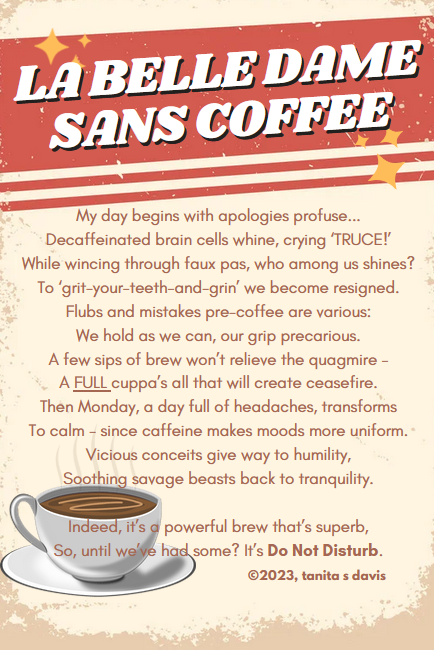
La Belle Dame Sans Coffee
My day begins with apologies profuse,
Decaffeinated brain cells whine, crying ‘truce!’
Whilst wincing through faux pas, who among us shines?
To ‘grit-your-teeth-and-grin’ we become resigned …
Flubs and mistakes pre-coffee are various,
We hold as we can, our grip precarious.
A few sips of brew won’t relieve the quagmire
A FULL cuppa’s all that will create ceasefire.
Then Monday, a day full of headaches, transforms
To calm – since caffeine makes moods more uniform.
Vicious conceits give way to humility,
Soothing savage beasts back to tranquility.
So, until we’ve had some? It’s DO NOT Disturb!
